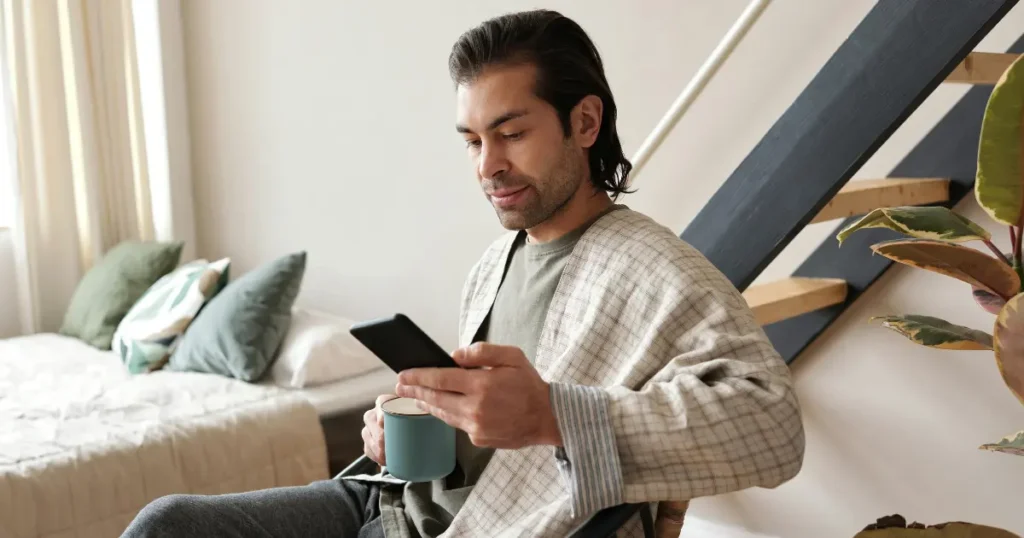
Introduction: Navigating Love in the Digital Age
Is your boo liking thirst traps a little too often? Or maybe you’re side-eyeing who’s sliding into their DMs? In today’s world, love doesn’t just live in the heart—it also lives online. And let’s be real: social media boundaries in relationships are no longer just “a good idea”—they’re the bare minimum. With alerts all the time, late-night scrolling, and flirty comments, social media can make it hard to trust people faster than you can say, “Who’s that girl?”
We’re all guilty of overthinking a like or decoding a story post as if it were a hidden message. However, if clear rules aren’t established, even the most stable couple can become messy online. Setting boundaries isn’t about being in charge; it’s about keeping the love real, the connection strong, and the drama off the air. Let’s discuss boundaries if you want to keep your relationship healthy in a world where everyone is easily accessible. Let’s break it down.
Understanding Social Media Boundaries in Relationships
Have you ever felt that it was weird that your partner double-tapped someone’s hot picture or talked to their ex at midnight? That uneasy feeling often stems from blurred digital lines, and that’s where clear, bold social media boundaries in relationships come in.
You may want to read: Social Media Boundaries After Cheating: Save Your Love Life
At its core, these are the rules and expectations couples set to guide their online interactions. If it’s about choosing what’s okay to post, how to handle direct messages, or when to tag each other in posts, having healthy social media boundaries in relationships is like emotional insurance—it protects your bond before things get messy.
Why does this matter? Setting digital boundaries in relationships helps avoid misunderstandings, boosts digital trust building, and reduces social media-induced jealousy. It’s not about spying; it’s about digital health in relationships and mutual respect.
When couples openly discuss their relationship expectations online, they’re not just scrolling—they’re investing in healthy relationships built on trust, not screenshots.
You may want to read: How To Set Boundaries In A Relationship Without Being Controlling
The Emotional Impact of Digital Overexposure

Ever felt like you’re talking to a wall because your partner’s glued to their phone? That annoying little habit has a name—phubbing (phone + snubbing). Wikipedia defines phubbing as when someone ignores their partner in favor of their phone, and yes, it’s killing the vibe in many modern love stories.
You may want to read: How to Avoid Situationship and Love With Clarity
When there are no clear social media boundaries in relationships, things can go sideways fast. Scrolling endlessly, responding to every notification, or checking who liked your post repeatedly isn’t just a waste of time; it erodes emotional connection. It creates distance, breeds social media trust issues, and leaves one partner feeling like a second place on a screen.
Too much screen time can trigger relationship anxiety, fuel online validation in relationships, and lead to real burnout. Love needs attention, not distractions. If your phone receives more attention than your partner, it’s time to reconsider your screen time.
You may want to read: What Kills Long-Distance Relationships Even When Love Is Real
Recognizing Signs of Digital Intrusion
Let’s not sugarcoat it—snooping through your partner’s phone without their permission is not cute; it’s a red flag. When there are no digital boundaries in relationships, things can become very messy quickly. Constantly checking each other’s socials, demanding passwords, or “casually” scrolling through DMs are all signs of digital intrusion—and it’s not doing your love life any favors.
These behaviors clearly indicate issues with trust in social media. While some might claim it’s “just being honest,” what it really does is chip away at trust and kill personal autonomy. Being in a healthy relationship shouldn’t feel like being watched.
If you’re checking their phone more than you’re checking in emotionally, you’re not building trust—you’re breaking it. Digital privacy is important for relationships. Love thrives when both people feel respected, not policed. Instead of sneaky scrolls, have open convos and set healthy social media boundaries in relationships that keep love safe and secure.
You may want to read: Unhealthy Boundaries In Relationships You Must Avoid Now
Establishing Healthy Digital Boundaries in Relationships

Setting up healthy social media boundaries in relationships isn’t rocket science, but it does take some honest talk. Firstly, both partners in the relationship must reach a consensus on what constitutes acceptable behavior online. There will be talk about how often you post about each other, who you follow, and how you handle direct messages from other people.
You may want to read: What Guys Want In A Long Distance Relationship—LDR Love Success
Open communication is key. Don’t just ghost on the topic or assume your partner “gets it.” Ask questions like, ‘How do you feel about being tagged in posts?’ Or: What’s your take on sharing relationship stuff online? Listening to them shows you trust each other online and value their space.
Consent matters, too. Nobody should feel compelled to share passwords or disclose private conversations. Decide together what is private and what is public, and stick to those lines. This way, you both stay comfortable and avoid social media conflicts that can impact your relationship satisfaction.
Remember: boundaries are about protecting your love, not putting it in a cage.
You may want to read: Coddling In A Relationship Is Killing Your Love Life
Navigating Public Sharing and Privacy
In today’s world, sharing adorable couple pics or relationship wins online is totally normal. However, finding the sweet spot between showing love and maintaining privacy is where most couples stumble. Posting every little detail can feel like you’re broadcasting your relationship 24/7, which might not sit well with your partner’s comfort level. That’s why setting digital privacy rules for relationships is a must.
Here’s the kicker—oversharing can sometimes lead to what AP News calls “micro-cheating.” It’s those small online actions, like flirting in comments or sending suggestive DMs, that don’t cross full cheating lines but still hurt trust. It can be stressful to tag someone in a way that makes your partner feel uncomfortable or upset.
Balancing public sharing and privacy means discussing openly what you both want to share and what remains private between the two of you. If you follow these rules, you can keep the trust and avoid drama in your digital relationship. For the sake of love, some things are better left alone.
You may want to read: Difference Between Love Bombing And Honeymoon Phase: Don’t Be Fooled
Addressing Jealousy and Insecurity Online

We’ve all been there—scrolling through your partner’s social media and suddenly feeling that knot in your stomach. Social media-induced jealousy is a real phenomenon, and it can infiltrate even the strongest relationships. Seeing your partner chat with old flames or like someone else’s photos can make you feel insecure very quickly.
You may want to read: 60 Intimate Relationship Questions That Spice Up Love
But here’s the deal: jealousy isn’t a sign you love less—it’s a signal that something needs attention. Instead of letting those feelings fester, talk about them openly. If you want to avoid keeping your feelings bottled up, express them by saying something like, “That comment made me feel a little uneasy.” This kind of honest chat fosters social media trust and prevents jealousy from escalating into full-blown conflict.
Setting clear online boundary violations can also help. Agree on what’s okay and what crosses the line. Remember that dealing with these feelings together will keep your relationship strong and your online space free of stress.
You may want to read: Boundaries In Dating Christian Couples That Keep Love Pure
The Role of Digital Detox in Relationship Health
At times, taking a break from screens can be beneficial for your relationship. A social media detox for couples means taking a break from online distractions, allowing you to focus on each other without being interrupted by notifications. Taking breaks from constant digital noise can help reduce stress, boost relationship satisfaction, and foster genuine intimacy in the real world.
During these detox periods, try simple activities that bring you closer. You can talk, go for a walk, or cook dinner together without your phones. These moments create space for genuine connection, which helps both of you feel better mentally.
Regular digital detoxes also raise digital relationship resilience, making it easier to handle social media pressures when you’re back online. It’s not just a break from your phone to disconnect now and then. It’s a way to keep your love healthy and strong.
You may want to read: What to Do When You Get Dumped—Heal Faster Now
Setting Boundaries with Friends and Family Online

Managing your relationship’s social life on social media isn’t just about you and your partner; it’s also about how you present yourself to others. Friends and family can make things more difficult by commenting or tagging without being asked or by sharing private moments without permission. These online boundary violations can blur the lines between personal and public life, making it tricky to protect your relationship’s privacy.
To keep things clear, set some ground rules together about what’s okay to share with friends and family online. For instance, agree on which pictures or updates can’t be shared or tagged with other people. Use relationship privacy settings to control who sees what. Sharing information helps you keep your independence and keeps outsiders from causing trouble.
Remember, protecting your digital space isn’t about shutting people out—it’s about ensuring your relationship remains a safe zone amid the noise of social media.
You may want to read: How to Make Love to Myself and Heal Deep Within
Coping with Boundary Violations
When online boundary violations happen, it can feel like a punch to the gut. Your partner may have read your texts without your consent or revealed something you wanted to keep private. Although it can be challenging, your response can have a significant impact on the development of digital trust in your relationship.
First, take a breath. Instead of reacting with anger, start with an open conversation. Instead of assigning blame, express your feelings about the violation. For example, I felt hurt when you posted that without asking me first. This technique helps maintain clear and respectful communication.
Next, agree on what needs to be done to prevent it from happening again. Setting fresh digital boundaries in relationships together shows commitment to respect and care.
Lastly, forgiveness plays a big role. Mistakes happen, and rebuilding trust takes time. With patience and honest effort, you can strengthen your bond and protect your relationship’s online self-care.
You may want to read: Signs Of A Low Effort Guy In A Relationship: Lazy Love
Future-Proofing Your Relationship in the Digital Age

Technology doesn’t stand still, and neither should your relationship. New apps, platforms, and digital habits emerge all the time, which means social media boundaries in relationships need regular updates to remain relevant and effective.
Make it a habit to check in with each other about your online relationship expectations. Talk about what works and what doesn’t. Perhaps new problems are arising due to emerging social media trends, or you both are keen to explore new ways to safeguard your relationship’s digital privacy.
These conversations keep your bond strong and your digital boundaries clear. By staying flexible and aware, you’re not just reacting to problems—you’re actively nurturing your love in the ever-changing digital world. That’s true relationship health in the 21st century.
Conclusion: Embracing Digital Boundaries as Acts of Love
Social media boundaries in relationships aren’t just rules—they’re acts of love. Setting and respecting these boundaries helps build trust, keep intimacy alive, and protect your connection from digital distractions. Setting boundaries is a way to keep your love safe and strong in this digital age. It’s not a one-time thing; it’s a journey where both people grow together through respect and open conversation. It’s about taking care of one another, both online and offline.
FAQs: Navigating Social Media Boundaries in Relationships
Q: How can I discuss social media boundaries with my partner without causing conflict?
A: Start the conversation with “I” statements, like “I feel uneasy when…” to avoid sounding accusatory. Express your sentiments and listen attentively to what your partner has to say. Keep it calm, honest, and open—remember, it’s about teamwork, not blame.
Q: What are some signs that social media is negatively impacting my relationship?
A: Watch for feelings of jealousy, constant checking of your partner’s online activity, or arguments sparked by posts and messages. Suppose either of you feels emotionally drained or disconnected. In that case, it may be time to establish clearer digital boundaries in your relationship.
Q: Are there tools or apps that can help couples manage social media boundaries?
A: Yes! Apps like Moment or Forest help manage screen time, while Couply offers features tailored to couples for setting goals around phone use. These tools can help you maintain good habits and enhance the digital health of your relationships.